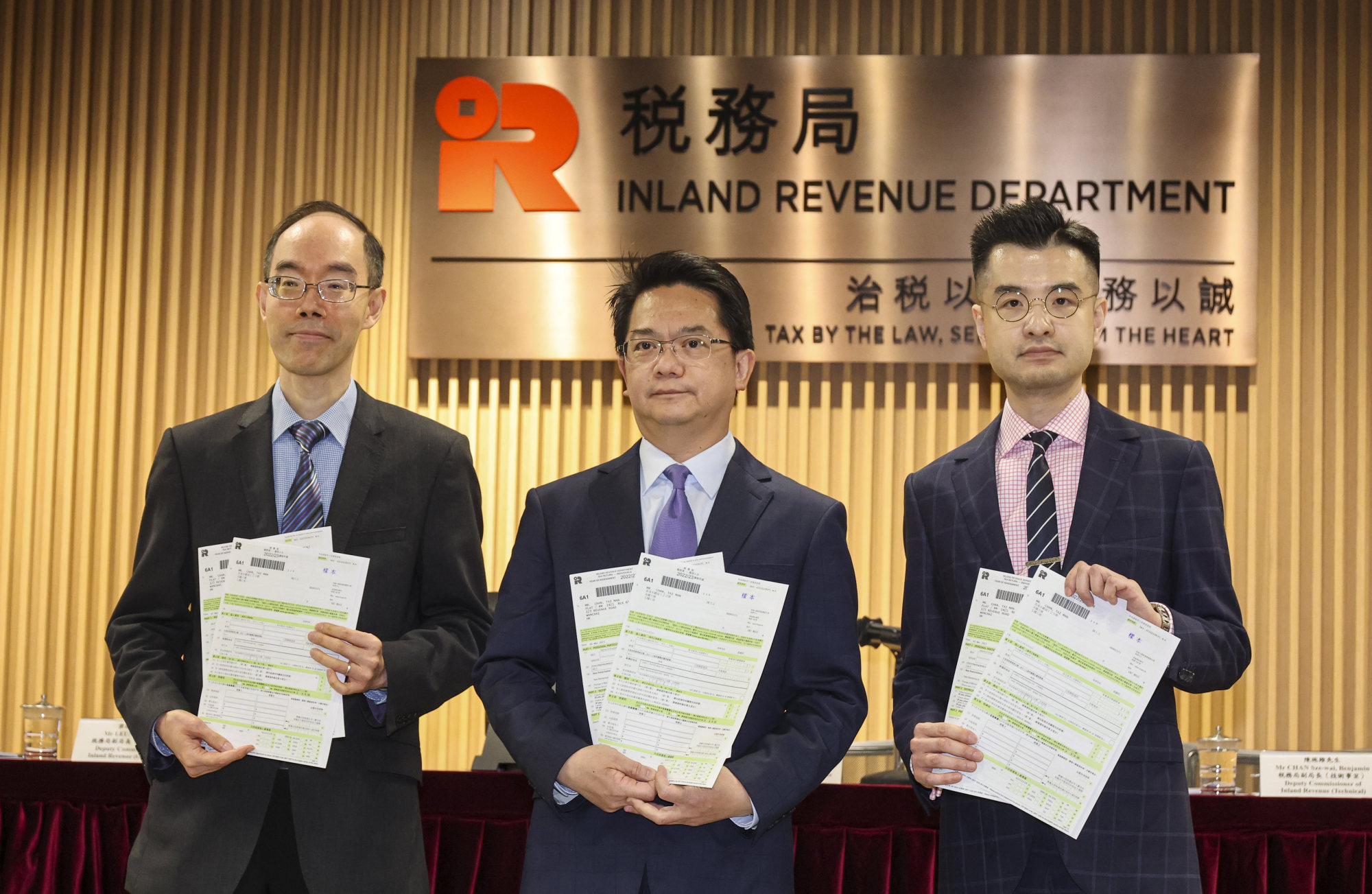
Hong Kong tax revenue drops HK$18.3 billion to HK$360.2 billion in 2022-23; decline in property and stock market activity blamed
- Latest tax income figures reverse upwards trend seen over past few years
- Inland Revenue commissioner says property market ‘not very active’ and sluggishness reduced tax take for year
The 2022-23 decline in the tax take, announced on Tuesday, reversed an upwards trend recorded over the previous few financial years and was almost HK$30 billion lower than projections made last year.
Provisional figures released by the Inland Revenue Department showed the taxman collected a record HK$378.5 billion in 2021-22, up HK$47.7 billion – 14 per cent – on 2020-21.
“The property market for the past year was not very active,” Commissioner of Inland Revenue Tam Tai-pang said. “In terms of transaction volume and prices, it cannot be said to be satisfactory. Thus, revenue from stamp duty has fallen.”

About 48 per cent of 2022-23 receipts came from profits tax, 4 per cent up on the previous financial year. Salaries tax accounted for about HK$79.5 billion, a 5 per cent increase.
But government income from stamp duty, charged on property sales and stock market transactions, dropped by 30 per cent, or HK$29.7 billion, to about HK$70 billion.
The biggest percentage increase in tax income came from estate duty, which amounted to HK$9 million, 4.5 times the figure for 2021-22.
Business registration fees added another HK$129 million to the public purse, more than double the HK$57 million logged the previous year.
The total amount raised from the sector for 2022 was HK$554.46 billion, down 39.6 per cent year on year and an 11.8 per cent drop compared with 2020.
Tam also attributed the fall in stamp duty to the sluggish stock market, but said he still expected a 21 per cent rise in stamp duty income for the 2023-24 financial year.
“We have made the estimate based on the data available early this year and the economic outlook was then assessed,” he said.
Tam estimated tax revenue could go up by 5 per cent to HK$379.3 billion for the 2023-24 year, with an predicted 4 per cent rise in salaries tax and a 2 per cent drop in profits tax.
He declined to comment on whether the estimate was too optimistic in light of the recent weaker economic performance of the city.
The tax chief acknowledged the number of tax returns issued had steadily declined in recent years but refused to speculate whether the drop was the direct result of an emigration wave.
The department issued about 2.97 million tax returns in 2020-21, 2.87 million the following financial year and around 2.4 million in 2022-23, according to Tam.
But Dr Billy Mak Sui-choi, an associate professor at Baptist University’s department of accountancy, economics and finance, said the amount of salaries tax collected was more important than the number of returns issued.
While he agreed the emigration wave could cause the workforce to shrink and so fewer people would need to file returns, he noted that salaries tax revenue was on the rise.
“This may show that many high-paid workers still have a stable job, although some workers might have become jobless during the Covid slump or earn less to fall out of the tax net,” he said.
He cited as an example last year’s 2.5 per cent pay rise for the city’s roughly 170,000 civil servants.
According to the Inland Revenue Department data, the number of demand notes for salaries tax rose 5 per cent to about 1.47 million in 2022-23. The amount collected was HK$79.49 billion, up from HK$75.57 billion in 2021-22.
Roy Lo Wa-kei, managing partner of the accountancy firm ShineWing (HK) CPA, cautioned the higher amount of salaries tax collected could signal a widening income gap.
“There are more rich people to pay higher salaries tax,” he said.
Lo agreed Hong Kong’s tax base was narrow but saw it as one of the city’s advantages and expressed reservations about introducing more indirect levies to boost government revenue.
“It would make our tax system too complicated and less competitive. Many investors are attracted to Hong Kong because of our simple tax system,” said Lo.
Meanwhile, Tam also asked the city’s 2.4 million taxpayers to look out for their “green envelope” tax returns in the next few days.
They will have to file the returns by June 2. For sole proprietors of unincorporated businesses, a three-month period is allowed and the filing deadline is August 2.
Those who file the forms online will be allowed an extra month, as an incentive to encourage taxpayers to use digital services.

